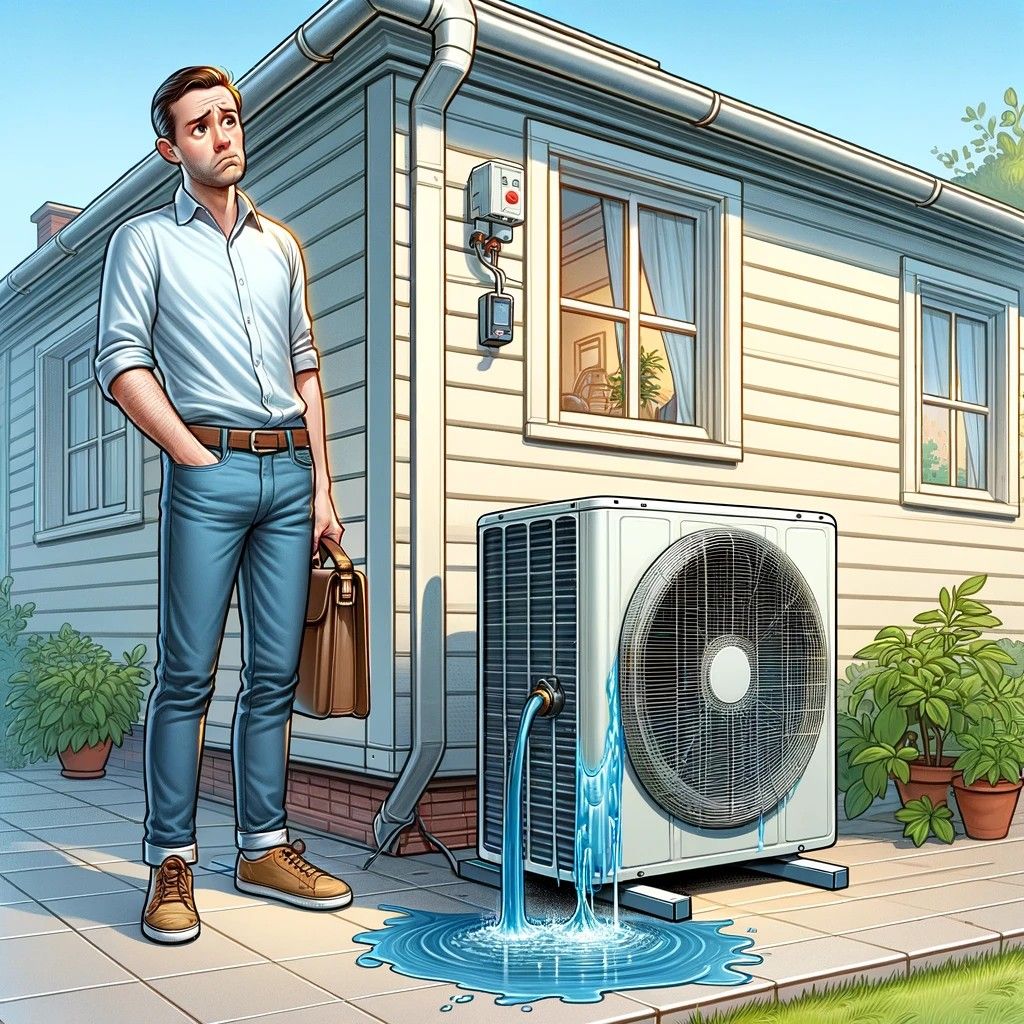
Understanding Water Leakage from Your Outdoor Mini-Split Condenser
Date:
Introduction
Noticing water leakage from your outdoor mini-split condenser unit can initially cause concern. However, it’s important to understand that this can be a normal aspect of your HVAC system’s operation. This article explains why water leakage from the condenser is often expected and not a sign of malfunction.
The Role of Condensation in HVAC Systems
Condensation is a key process in the cooling function of mini-split systems. As the unit cools the indoor air, humidity is condensed into water. This water is typically expelled from the indoor unit to the outside, which can sometimes be observed as leakage from the outdoor condenser.
Why Water Leakage Is Normal
1. Cooling Process
During the cooling process, the refrigerant absorbs heat from the indoor air, causing moisture in the air to condense into water. This condensation is a byproduct of efficiently reducing indoor temperatures.
2. High Humidity Conditions
In areas with high humidity, mini-split systems work harder to condense moisture from the air, resulting in more water being expelled through the condenser unit.
3. Defrost Cycle
In colder weather, the outdoor unit may enter a defrost cycle, melting any ice that has formed on the unit. The melting ice then drains away, which may be mistaken for a leak.
When to Be Concerned
While water leakage is typically normal, there are instances when it may indicate a problem, such as:
- Continuous Leakage: If water leaks continuously, even when humidity is low and the unit is not in a defrost cycle, it may indicate a blockage or issue with the drainage system.
- Excessive Water: Large amounts of water may suggest a malfunction in the system, requiring professional inspection.
Conclusion
Water leakage from your outdoor mini-split condenser unit is often a normal part of the system’s operation, primarily due to the condensation process during cooling and defrost cycles. Understanding this can alleviate concerns about the functionality of your HVAC system. However, if you notice abnormal leakage patterns, consulting with a professional is advisable to ensure your system continues to operate efficiently.



The conclusion effectively promotes a balanced understanding of water leakage, emphasizing both normalcy and the need for professional assessment in specific cases.
I agree, the article encourages homeowners to approach water leakage with a combination of reassurance and caution, fostering a pragmatic outlook.
I appreciate knowing when to be concerned about water leakage, as it provides clear signs to look out for in case of potential system issues.
Yes, the article offers practical guidance on identifying abnormal patterns of water leakage to ensure timely professional intervention if necessary.
The explanation of the role of condensation in HVAC systems was very informative and helped me understand the normalcy of water leakage from the outdoor condenser.
I agree, it’s important to understand the science behind the process to distinguish between normal and abnormal leakage.
I found the explanation about the defrost cycle particularly interesting, as it’s a phenomenon that may cause confusion but is actually a natural part of the system’s operation.
The article effectively debunks common misconceptions surrounding water leakage from outdoor mini-split condensers, providing reassurance to homeowners.
Agreed, understanding the defrost cycle helps prevent unwarranted concern over water drainage during colder weather.
I had no idea that the amount of condensation and water leakage could vary based on the weather. The article was eye-opening in that respect.
Absolutely, the weather’s influence on condensation and water drainage is an intriguing aspect of HVAC operation that homeowners should be aware of.
The real-world examples provided in the article enhanced the explanation, making it relatable to different climate conditions.
The continuous leakage warning is crucial to prevent potential damage due to blockages. It’s important for homeowners to be aware of this possibility.
Absolutely, recognizing the signs of a blockage early on can save time and money by addressing the issue promptly.
The article did an excellent job of explaining the link between high humidity conditions and increased water expulsion from the condenser, shedding light on environmental factors affecting HVAC systems.
Indeed, it’s essential to consider external factors like humidity levels when assessing water leakage and system performance.
The environmental perspective helped clarify the variability in water leakage patterns and emphasized the role of local climate in system operation.
The article’s clear distinction between normal and abnormal water leakage patterns prevents unnecessary stress about system malfunctions, promoting peace of mind for homeowners.
Absolutely, alleviating unnecessary worry through targeted explanations benefits homeowners and their overall experience with HVAC systems.
The article offers practical insights into interpreting water leakage, empowering homeowners to make informed decisions about their HVAC systems.